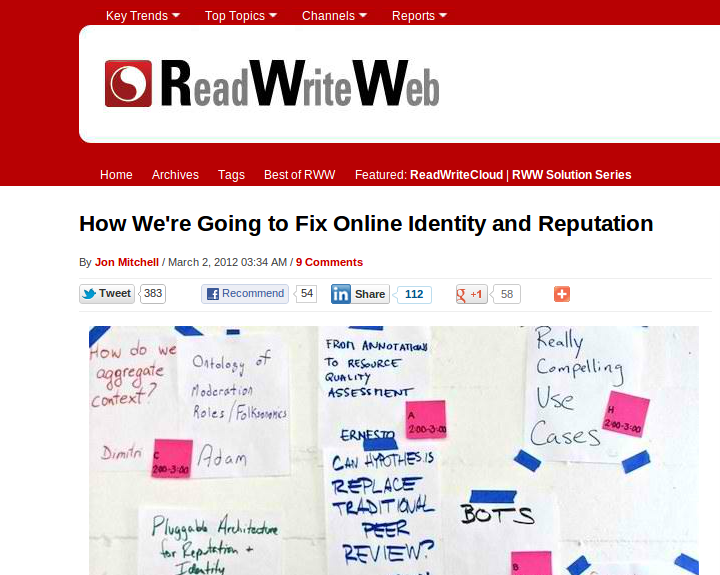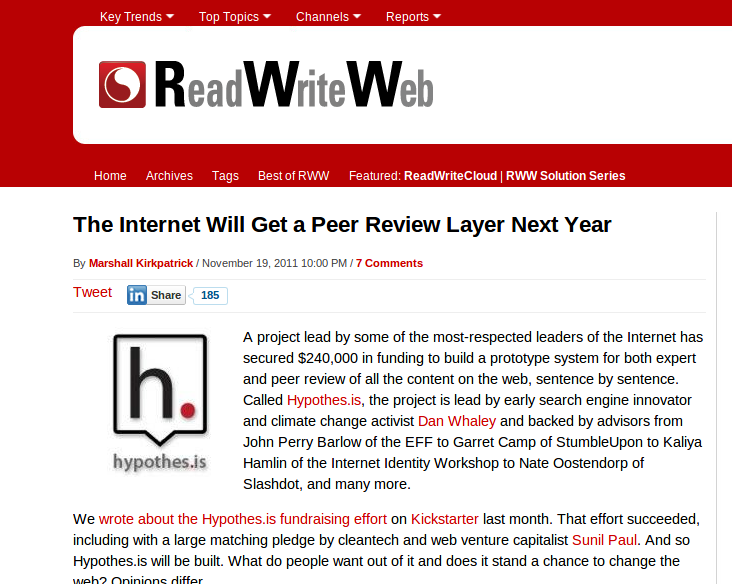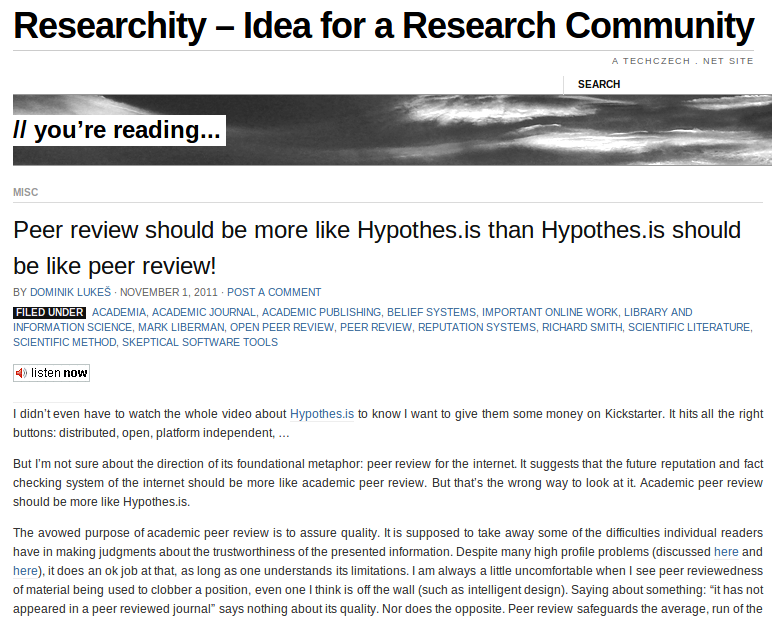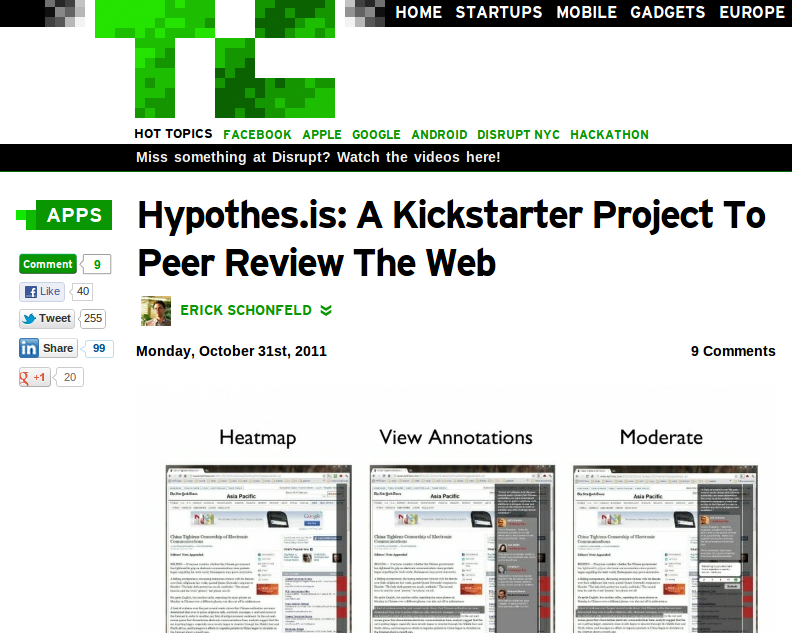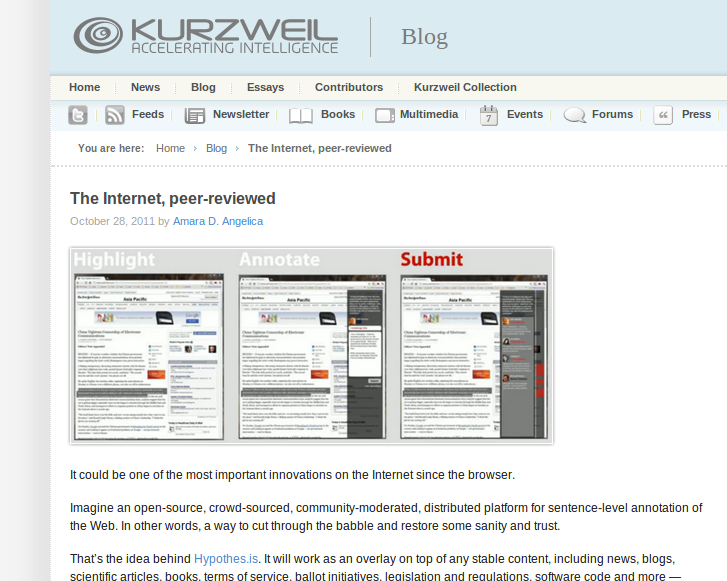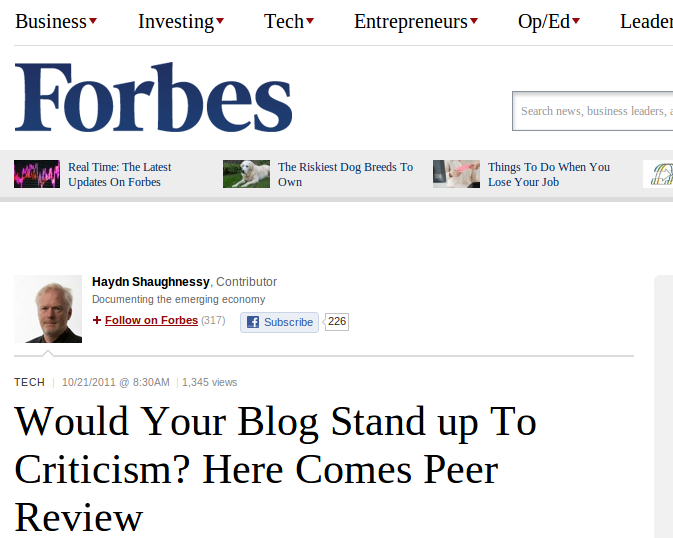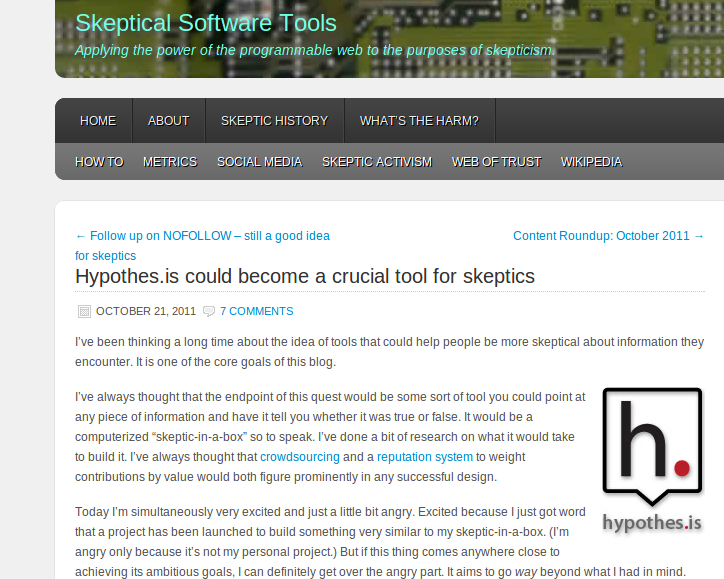Imagine...
If wherever we encountered new information, sentence by sentence, frame by frame, we could easily know the best thinking on it.
If we had confidence that this represented the combined wisdom of the most informed people—not as anointed by editors, but as weighed over time by our peers, objectively, statistically and transparently.
If this created a powerful incentive for people to ensure that their works met a higher standard, and made it perceptibly harder to spread information that didn't meet that standard.
These goals are possible with today's technologies.
They are the objectives of Hypothes.is.
Reserve your username.What is it?
We think relatively simple tools can help us all improve the quality of information on the Internet, and by extension in the greater world around us.
Hypothes.is will be a distributed, open-source platform for the collaborative evaluation of information. It will enable sentence-level critique of written words combined with a sophisticated yet easy-to-use model of community peer-review. It will work as an overlay on top of any stable content, including news, blogs, scientific articles, books, terms of service, ballot initiatives, legislation and regulations, software code and more-without requiring participation of the underlying site.
It is based on a new draft standard for annotating digital documents currently being developed by the Open Annotation Collaboration, a consortium that includes the Internet Archive, NISO (National Information Standards Organization), O'Reilly Books, Amazon, Barnes and Noble, and a number of academic institutions.
Interested in participating? Reserve your username.
Reputation Workshop.
One of the most important parts of our design is the reputation model that will underpin the system. A reputation model is a way for a user community to collectively regulate and calibrate the contributions of its members. This is a well-established field of study, encompassing many years of academic research and with numerous examples of working systems deployed in the real world.
Thanks to a generous grant from the Alfred P. Sloan Foundation we hosted a Workshop on February 22-24, 2012 in San Francisco at the Fort Mason Center, in order to share with and learn from key members of the academic, non-profit, and commercial sectors who research and use reputation systems.
Press:
Read Write Web:
How We're Going to Fix Online Identity and ReputationRead Write Web:
The Internet Will Get a Peer Review Layer Next YearResearchity:
Peer review should be more like Hypothes.is than Hypothes.is should be like peer review!TechCrunch:
Hypothes.is: A Kickstarter Project To Peer Review The WebKurzweil Accelerating Intelligence:
The Internet, peer-reviewedForbes:
Would Your Blog Stand up To Criticism?Skeptools:
Hypothes.is could become a crucial tool for skeptics12 Principles:
1
2
Work everywhere
3
Non-profit
4
Neutral
5
100% community moderated
6
Merit based
7
Pseudonymous
8
International
9
Transparent, auditable
10
Think long term
11
Many formats, many contexts
12
Work with the best
Frequently Asked Questions:
Why will this project succeed? Haven't there been other efforts like this before?
Doesn't this require the contribution of a large number of people to succeed? How do you create that at the outset?
This is true of any large community site or marketplace. Ebay, Craigslist, Yelp, Match.com and any site that relies on "network effect" faces the same catch-22 at launch: the utility of the service only happens after a certain scale.
Here are three approaches we propose to solve this problem-
- create a tool that's useful even before the larger community arrives.
- engage pools of domain experts that are willing to help jump start quality analysis.
- drive sufficient traffic to create critical mass. We have considerable expertise in these areas and will pursue these strategies as well as others in order to get the job done.
Help us by reserving your username now!
Do you really think that people have the disposition, patience, or qualifications to participate in this way?
This seems like a never-ending challenge; will we ever stem the tide of lousy information?
If what is published is immediately fact and logic-checked, in a detailed and highly visible way, it will necessarily put pressure upstream to the point of authorship. In order to accomplish this we need better feedback mechanisms. Standard comments just aren't up to the task, and neither are newer systems such as Disqus, IntenseDebate, Facebook Comments or others. While interesting, none of them fundamentally change the comment model. It's time for a new set of tools.
We don't expect perfection. Human affairs are a messy business. We do think things can be substantially improved.
Won't people try to game the system?
Yes, we are certain they will. It's part of human nature. In fact, the more effective the system, the more sophisticated we expect the attempts to game it will be. Minimizing and monitoring for gaming over the long-term are primary design considerations. Reputation in distributed systems is a mature field of study. Algorithms and social approaches to maximize trust even where little is initially known about participants and their contributions are numerous and diverse. Some of the world's experts in this field are among the team members and advisors.
What's the incentive for any site to add this feature?
We don't expect or need sites to enable this functionality. The system will use a range of interfaces, including a browser plug-in, URL shorteners, a destination site and other approaches to wrap existing web content with our toolkit. We'll also publish an API for third party developers and websites. In the future, mobile apps will also be developed for iphone, ipad and android devices.
Why will people download your plug-in?
They won't be required to download the plug-in, though they will have to in order to participate most completely as editors. Because we'll offer the capability through multiple means, users will initially be able to experience Hypothes.is first just by following a link. Also, keep in mind, with newer browser versions, installing plug-ins has become as fast and easy as clicking a link - usually no restart of the browser is even required. People download apps for their smart phones every day, so we think getting people to install a plug-in to their browser is more a function of messaging and creating the right value proposition than anything else.
Aren't you secretly slanted towards a particular political world-view?
We don't pledge allegiance to a political party, nor are we advocates for a particular political philosophy. Hypothes.is is explicitly non-partisan, recognizing that people of all nations and all political perspectives have a need for trust-worthy information in their civic and personal lives. While some web content relates to politics, most does not. Hypothes.is is about encouraging fact-based discussion and robust analysis across a wide variety of subjects.
Why a non-profit?
Many have observed over the last few centuries that it is difficult to preserve journalistic objectivity over a long time period as a commercial enterprise. As serial entrepreneurs, we are particularly well aware of the pressures on high-tech commercial enterprises to generate profits for investors - and the difficulty, or impossibility, of preserving the original goals of a project under these expectations. As a result, we think Hypothes.is is best-suited to fulfill its mission as a non-profit social enterprise, to ensure the long-term focus on its founding mission. We will employ a mix of best of class practices from this evolving class of enterprises to ensure long term revenue and sustainability.
Why "Hypothes.is"?
A thesis is the foundation upon which any persuasive argument rests - namely, that which you seek to prove. It is the first thing you should start with when writing, and the first thing you should look for when reading. A hypothesis is a thesis in the form of a proposed explanation for some observable phenomenon. It embodies two key characteristics essential to the discovery of new knowledge - curiosity and humility. A hypothesis changes into a thesis when supported by facts and evidence. Hypothes.is will provide a toolkit to help you assess whether the theses you read on the web are supported by facts and evidence.
You might have noticed the odd .is at the end of our name. It's the two letter internet code for the nation of Iceland. While we've used this as a handy way to spell the word "Hypothesis" (a technique known as domain hacking), we also think the Icelandic people are great representatives of the kind of thinking we're trying to nurture. In 2010, Iceland's parliament passed the forward-looking Modern Media Initiative, creating a process through which 13 separate laws will be edited with the aim of establishing strong protections for the freedom of information, speech and expression. The protections contemplated would be among the most advanced in the world. Also, Iceland has recently undertaken the process of crowdsourcing a rewrite of their constitution. We approve!
Core Development Team:
Randall Leeds
Lead Developer
Randall is the lead developer for Hypothes.is and a contributor to the popular Apache CouchDB and Gunicorn projects. He was previously a developer at Meebo. Randall was a co-creator of an open source Social Services 211 system which won an award at the Open Gov West conference held in Portland and earned the team an invitation to The White House Champions of Change program on technology and innovation. He holds a degree in Computer Science from Brown University.
Jehan Tremback
Interface Designer
Jehan is a UX/interface designer whose practice is rooted in the discipline of industrial design. His interfaces use the principles of visual simplicity and user-centered design to produce experiences that are smooth and intuitive. Past projects include: NDAA2012.us, a site annotating and raising awareness of the 2012 NDAA, and The BioFab Expression Designer, a DNA search interface done in collaboration with the Lawrence Berkeley National Laboratory.
Dan Whaley
Founder / Product Manager
Dan is a coder and entrepreneur that created the first online travel reservation company on the web (ITN/GetThere) in 1995. He wrote much of the software, launched the business and guided the long term technical and product vision. GetThere went public in 1999 and was sold to Sabre in 2000 with nearly 600 employees while processing approximately 50% of travel transacted online. Dan currently serves as a director of Sauce Labs, the leading open source functional testing company and Getaround, a peer-to-peer car sharing company.
Advisors and Collaborators:
Boris Aleksandrovsky
Boris specializes in solving problems of search, machine learning and data analysis on large scale by employing distributed and scalable software architectures. His interest is in innovative ways of automatic understanding and visualization of textual information.
He has extensive expertise in information retrieval, linguistics, NLP, machine learning, AI, the semantic web and analysis of social media. He is working on analysis of large data sets using distributed computing technologies (Hadoop, Lucene, HBase, Mahout and friends). He has also done research in speech and handwriting recognition.
Jeff Atwood
Stackexchange
@codinghorror
Jeff co-founded Stackexchange, a question-and-answer network that is collaboratively built and maintained by users, and is one of the most well-known and highly trafficked sites on the Internet. The site utilizes an earnable privileges reputation system, with the ultimate goal of the site being to cull good answers “to every imaginable programming question.” Jeff began his professional efforts in technology as a software developer, working various implementations of Microsoft's BASIC in the 1980’s. Fascinated by the human side of software development, Jeff blogs about just that and more on his popular blog Coding Horror.'
John Perry Barlow
EFF
@JPBarlow
John Perry Barlow is a retired Wyoming cattle rancher and a former lyricist for the Grateful Dead. In 1990 he and Mitchell Kapor founded the Electronic Frontier Foundation (EFF), an organization which fights for the rights of citizens in the digital world. He currently serves as its Vice Chairman. Since May of 1998, he has been a Fellow at Harvard Law Schools Berkman Center for Internet and Society. His widely distributed manifesto, A Declaration of the Independence of Cyberspace, can be found on more than 20,000 web sites.
Charles Bazerman
UC Santa Barbara
Chuck is one of the worlds leading experts on writing and has contributed significantly to the establishment of writing as a research field. He is the current Chair of the Conference on College Composition and Communication (CCCC), the national professional association of writing instructors in the US. He is the author of over 18 books and 20 edited editions. He is one of the founders of Rhetoricians for Peace.
Phil Bourne
UC San Diego / PLoS
Philip is the co-founder and Editor-in-Chief of the open access journal PLoS Computational Biology. Philip has recently launched the Beyond the PDF initiative to develop a mandate, open source code and a set of deliverables to be used by scholars to accelerate data and knowledge sharing and discovery. He is a Past President of the International Society for Computational Biology, and an elected fellow of the American Association for the Advancement of Science (AAAS).
Adam Christian
Sauce Labs / Slide
@admc
Adam is a world-class expert in browsers, client side development and software testing. He was a former lead engineer at Mitch Kapors Open Source Applications Foundation (where he developed the Windmill Testing Framework) as well as at Rearden Commerce and Slide. He leads Sauce Labs implementation of Sauce Builder, which is the evolution of Windmill and a key new tool for rapid implementation of software testing suites interoperable with Selenium.
John W. DuBois
UC Santa Barbara
Jack is one of the foremost experts on the role of stance in language, and how it flows and changes even within the same conversations. Stance is the position we take relative to external things, and particularly how we align ourselves with respect to others in doing so. Stance is central to language, and is one of the most important components of the approach we will take with Hypothes.is.
Kathleen Fitzpatrick
MLA / MediaCommons
Kathleen Fitzpatrick is Director of Scholarly Communication at the Modern Language Association, and is on leave from a position as Professor of Media Studies at Pomona College, in Claremont, California. She is the author of Planned Obsolescence: Publishing, Technology, and the Future of the Academy, and she is co-founder of the digital scholarly network MediaCommons, an open platform for the scholarly peer-review of books. She is one of the most outspoken and respected voices imagining the reinvention of peer-review in the modern, digital and connected age.
Kaliya Hamlin
Internet Identity Workshop
@identitywoman
Kaliya Hamlin is one of the worlds leading experts in user-centric identity, privacy and data sharing and co-founded the Internet Identity Workshop (IIW). She has been a key figure in the development of OpenID v2, Information Cards, OAuth v1 and v2, Portable Contacts, the Salmon Protocol, XRD v1, XDI, and Webfinger.
Steve Hazel
Sauce Labs / Bittorrent
@sahazel
Steve is a long-time contributor to and architect of leading peer-to-peer systems. He is the former Director of Engineering for Bittorrent, and a previous engineer at Audiogalaxy and a contributor to Freenet. Now at Sauce Labs, he leads their effort to bring Selenium, the dominant open-source testing framework, to the cloud.
Salim Ismael
Singularity U
@salimismail
Salim has operated seven early stage companies and is a frequent speaker on internet technologies, private equity and entrepreneurship. Salim was the founding Executive Director of Singularity Univ., which is training a new cadre of leaders to manage exponentially growing technologies. Prior to that, Salim was a Vice President at Yahoo and the Head of Brickhouse, Yahoo's internal ideas factory.
Brewster Kahle
Internet Archive
Brewster studied AI at MIT with Marvin Minsky and Danny Hillis, and later joined Hillis at Thinking Machines where Brewster developed WAIS (sold to AOL). He later founded the early innovator of page rank, Alexa (sold to Amazon), and simultaneously created the Internet Archive, the non-profit archive of the version history of all web pages (and much more). More recently he founded the Open Content Alliance to begin digitizing, archiving and providing open access to the worlds texts.
Thede Loder
Boxbe
Thede Loder is the Founder, Chief Executive Officer, and President at Boxbe, Inc. He founded the firm in 2005. Mr. Loder also serves as an Advisor at Ignite Capital. He focuses on the technology issues of the firm. Mr. Loder is an experienced Entrepreneur, Consultant, Researcher, and Technologist. In 1995, he helped design, build, and launch the popular Match.com consumer dating service. Mr. Loder also co-founded Leverage Information Systems in 1996. From 2002 to 2004, he studied Artificial Intelligence (multi-agent systems) and conducted research in Information Economics as a Fellow in the Socio-Technical Infrastructure for Electronic Transactions (STIET) program at the Univ. of Michigan.
Andrea Lunsford
Stanford
Andrea is Stanford Univ.'s Director of the Program in Writing and Rhetoric PWR. During her remarkable career, she has revolutionized the way that college students learn how to write, research, and present arguments. Andrea has served as Chair of the Conference on College Composition and Communication (CCCC), as Chair of the Modern Language Association Division on Writing, and as a member of the MLA Executive Council. Andrea is also the force behind the large-scale Stanford Study of Writing. The longitudinal study that investigated how todays students write by analyzing 14,672 writing samples, including everything from in-class assignments, formal essays, and journal entries to emails, blog posts, and chat sessions.
Erik Martin
@hueypriest
Erik is the General Manager of Reddit, the self-proclaimed “front page of the Internet”. Erik took over the reins of Reddit in 2008 from the original founders and has been responsible for managing it through it’s extraordinary growth to one of the largest and most influential web properties in the world, with over 2 billion page views a month as of December 2011. Under Martin's lead, Reddit was instrumental in organizing opposition to proposed SOPA and PIPA antipiracy laws, even going dark in protest along with other sites on Jan. 18.'
Nicholas Merrill
Calyx Institute
Nicholas Merrill is the founder of Calyx Internet Access and the Calyx Institute. He was the first person to file a constitutional challenge against the National Security Letters statute in the USA PATRIOT Act. After receiving a National Security Letter NSL from the FBI, he sued the FBI and Department of Justice and became the plaintiff in the historic lawsuit Doe v. Ashcroft, which persisted through four US Attorney Generals and resulted in a precedent setting victory. As a result of the original NSL, Merrill was gagged from speaking publicly for over six years.
Johnathan Nelson
Hackers and Founders
@hackersfounders
Jonathan is the founder of Hackers and Founders, an organization now with over 15,000 members in cities all around the world that brings together coders, entrepreneurs and innovators. Jonathan has an inspiring vision for how HF can open-source, disrupt and invert the process of forming teams, founding companies, finding capital and learning about everything from coding to business operations. Its inspiring, and it will most definitely change everything about the startup process as we know it.
Nate Oostendorp
Slashdot
@nateoostendorp
Nate was the technical co-founder of Slashdot, which has become a canonical example of how to do online reputation well. Nate is now the founder of Ingenuitas which intends to open-source the manufacturing process, by building open tools for collaboration around computer vision, data acquisition and robotics.
Rufus Pollock
Open Knowledge Fdn.
@rufuspollock
Dr. Rufus Pollock is co-Founder and Director of the Open Knowledge Foundation, makers of the open source AnnotateIt bookmarklet. Rufus is also a Shuttleworth Foundation Fellow, and an Associate of the Centre for Intellectual Property and Information Law at the Univ. of Cambridge. He has worked extensively as a scholar and developer on the social, legal and technological issues related to the creation and sharing of knowledge.
Drummond Reed
Connect.me
@drummondreed
Drummond is a long time leader and innovator in the fields of Open Identity (OpenID), Data Portability, and structured data standards. He is cochair of the XRI and XDI Technical Committees under OASIS, and a steering committee member of DataPortability.org. His depth of knowledge of the history, evolution and future direction of standards in identity and related domains is unmatched. He is also a co-founder of connect.me, an innovative new social vouching service.
Paul Resnick
Univ. of Michigan
Few people have more experience with the theory and practice of reputation systems than Paul Resnick. Over the course of his career at the Univ. of Michigan he has helped shape reputation into a mature field of study, and has nurtured a generation of students in the area.
Mikael Rogers
Pouch
@mikeal
Mikeal is a leading contributor to the open source Node.js project. He currently is involved in a stealth project called Pouch. Previously he was the first employee of CouchOne, a principal of Mitch Kapors Open Source Applications Foundation, and a developer at Mozilla.
Rob Sanderson
Los Alamos Ntl. Laboratory
Dr Robert Sanderson is the co-chair of the W3C Community Group on Open Annotation, and principal editor of the Open Annotation specification. He is a scientist at Los Alamos National Laboratory's Research Library, and was previously a lecturer in Computer Science at the Univ. of Liverpool. He obtained his PhD in 2003, and his research interests include digital humanities and technical architectures for scholarly communication.
Gigi Sohn
Public Knowledge
Gigi is the co-founder and president of Public Knowledge, a non-profit dedicated to preserving the public’s access to knowledge, promoting creativity through balanced copyright, and upholding and protecting the rights of consumers to use innovative technology lawfully. As PK’s chief strategist, fundraiser and public face, she is frequently quoted in the New York Times, Washington Post and Wall Street Journal, as well as in trade and local press and has appeared on numerous television and radio programs, including the Today Show, The McNeil-Lehrer Report, C-SPAN’s Washington Journal and National Public Radio’s All Things Considered and Morning Edition. In May 2006, the Electronic Frontier Foundation gave Gigi its Internet “Pioneer” Award.
Mark Surman
Mozilla Fdn.
@msurman
Mark is the Executive Director of the Mozilla Foundation. He has been an active technologist and community builder for almost 20 years, including stints as an Open Philanthropy Fellow at the Shuttleworth Foundation, and the founding director of telecentre.org, a $26m effort to network community technology activists in countries around the world.
Reputation Fellows:
Michele Catasta
EPFL
@pirroh
Michele was in the founding team of Sindice.com, currently the largest search engine for the Semantic Web. As the lead data engineer, he developed a passion for making sense out of large [semantically-annotated] Web datasets -- a passion that has become a vocation while interning for Google and Yahoo! Research. As a PhD Candidate at EPFL, Michele is now working with Prof. Karl Aberer on rethinking user profiling: from a mere tool to enhance the Web experience, to a looking glass into all the facets of your personality.
Ernesto Damiani
Univ. of Milan
@edamiani064
Ernesto Damiani is a professor at the Universiti degli Studi di Milano, Italy, and the director of the Univ.'s Ph.D. program in computer science. Ernesto has worked a lot on the connection between the notion of reputation and the one of trust among cooperating agents at different degrees of rationality. Nowadays, he is leading some projects on hybrid incentives - and technology-based techniques for controlling knowledge sharing and improving knowledge quality. Ernesto would like to bring this perspective to a scheme for increasing the trustworthiness of resources available on the global Net.
Luca de Alfaro
Univ. of California
@lucadealfaro
Reputation systems have been my main research and development interest in the last few years. After three years at Google, I am back at UC Santa Cruz, where I am continuing work on reputation systems, ranking, and crowdsourcing. I am also helping establish a research operation at UCSC Silicon Valley, with the goal of providing a better link between UCSC and Silicon Valley. I have written extensive software, both at Google, and at UCSC, being one of the main authors of the WikiTrust codebase. I am also knowledgeable in developing for the web, hosting, scalability, and architecture (site architecture) issues. I have consulted for several start-ups, and most recently I am providing technical and scientific advice to VoiceBase.
Chris Dellarocas
Boston Univ.
@tournesol67
Chris has devoted a large part of his academic career at MIT, the Univ. of Maryland and, now, Boston Univ., to the study of reputation systems, online reviews and collective intelligence. He has served as advisor to several startup ventures in this space. His writings and ideas have influenced a generation of scholars and practitioners worldwide.
Doug Downey
Northwestern Univ.
Doug focuses on research in machine learning (ML), with a particular focus on extracting information from the World Wide Web. He's excited about developing ML methods for automatically estimating annotator expertise and specialization in Hypothes.is, and conversely investigating how Hypothes.is annotation at Web-scale might enable fundamentally new ML capabilities.
Susan Gauch
Univ. of Arkansas
Susan is an expert in intelligent search who developed one of the first meta-search engines (ProFusion) and one of the first video search engines (VISION). She is a leading expert and well-published author on the use of ontologies in personalized search. Her current research focuses on personalization in the CiteSeerx project and searching in virtual worlds. Susan is the Rodger S. Kline Leadership Chair, Professor, and Head at the Univ. of Arkansas.
Radu Jurca
Google Zurich
Radu Jurca obtained the Ph.D. degree in Computer Science from Ecole Polytechnique Federale de Lausanne (EPFL) in 2007. His work on reputation mechanisms was awarded the Victor Lesser Distinguished Dissertation Award (2008) and EPFL's Best Thesis Award (2008). Radu later joined Google, where for the last 4 years he worked on various problems like geographical information retrieval, ranking user-generated content, reputation models for data sources, and general data-mining techniques.
John Riedl
Univ. of Minnesota
In 1992 John co-founded the GroupLens project on recommender systems, and has been co-directing it since. He also co-founded Net Perceptions, the leading recommender systems company during the first Internet boom. In GroupLens he has been leading the way in understanding how intelligent user interfaces can help online communities work and play together more happily.
He has been named Fellow of the ACM and IEEE, and is founding co-editor-in-chief of the ACM Transactions on Interactive Intelligent Systems journal. He has co-authored Best Paper winners at the IUI, WikiSym (twice), CSCW, and Data Engineering conferences. John has also received the MIT Sloan School Award for Innovation in E-Commerce, the Computer Science teaching award (four times) and the George Taylor Award for Exceptional Contributions to Teaching. Riedl has authored over 100 publications, including one book and many papers.
Bayle Shanks
PieTrust
@bshanks
Bayle is the founder of PieTrust, an Open Company developing a collusion-resistant reputation system. The system can be used to make decisions in which the most respected people have the most weight, to make payments proportional to reputation, to trade services using reputation as form of compensation, or to assess the knowledge or skill levels of individuals via peer evaluation. Bayle's background is in cognitive studies, particularly artificial intelligence and neuroscience.
Code.
We’re open source, implemented largely in Python and Javascript. You can find us on Github.
Hypothes.is is built on top of an open source annotation framework called Annotator developed in partnership with the Open Knowledge Foundation. It is also available on Github.
We’d love your help. Please join us in #hypothes.is on freenode.
Join.
We're hiring full time JavaScript or Python developers who pick up new tools and skills quickly and love evaluating the next hot thing with a healthy skepticism and a pragmatic lean. If you like PostgreSQL or ElasticSearch, swoon over the beauty of Pyramid or d3.js, get excited about continuous deployment, rapid iteration, or rich HTML5 browser applications you should be right at home.
We’re open-source, non-profit and well funded. Join us because you want to work with great people and create real, powerful change in the world around you.
Contact us.Donate.
We’re trying to change the world, and we think we can only accomplish it as a non-profit. We haven’t made that decision lightly, and in doing so have drawn from the counsel of many thoughtful advisors. In the past, we’ve funded our efforts using standard tech financing strategies. As a non-profit these are now unavailable to us.
Though we have a strategy to become revenue sustainable, we do need help over the next several years to get started. We are so grateful to all the support we’ve received so far from the Sloan Foundation and our friends on Kickstarter.
Please consider a gift.
Contact Us.
Welcome to Hypothesis.
Hypothesis is a distributed, open source system for the collaborative evaluation of information. We are in an early alpha period as we fine-tune our core annotation functionality. We would love for you to help us test it.
Test Hypothesis:
Once you've installed the extension and claimed your account, you can read the instructions first, or jump right into the sandbox.
Instructions:
Start Hypothesis
Click on the annotation icon in your address bar to turn on Hypothesis. This icon will also show you how many annotations there are on the page, and whether any of them are yours.
The Heatmap
The heatmap shows you where annotations are on the page. The pointers show the number of annotations....
Sandbox:
The path of the righteous man is beset on all sides by the iniquities of the selfish and the tyranny of evil men. Blessed is he who, in the name of charity and good will, shepherds the weak through the valley of darkness, for he is truly his brother's keeper and the finder of lost children. And I will strike down upon thee with great vengeance and furious anger those who would attempt to poison and destroy My brothers. And you will know My name is the Lord when I lay My vengeance upon thee.
Normally, both your asses would be dead as fucking fried chicken, but you happen to pull this shit while I'm in a transitional period so I don't wanna kill you, I wanna help you. But I can't give you this case, it don't belong to me. Besides, I've already been through too much shit this morning over this case to hand it over to your dumb ass.
Well, the way they make shows is, they make one show. That show's called a pilot. Then they show that show to the people who make shows, and on the strength of that one show they decide if they're going to make more shows. Some pilots get picked and become television programs. Some don't, become nothing. She starred in one of the ones that became nothing.
Now that there is the Tec-9, a crappy spray gun from South Miami. This gun is advertised as the most popular gun in American crime. Do you believe that shit? It actually says that in the little book that comes with it: the most popular gun in American crime. Like they're actually proud of that shit.
Look, just because I don't be givin' no man a foot massage don't make it right for Marsellus to throw Antwone into a glass motherfuckin' house, fuckin' up the way the nigger talks. Motherfucker do that shit to me, he better paralyze my ass, 'cause I'll kill the motherfucker, know what I'm sayin'?
Normally, both your asses would be dead as fucking fried chicken, but you happen to pull this shit while I'm in a transitional period so I don't wanna kill you, I wanna help you. But I can't give you this case, it don't belong to me. Besides, I've already been through too much shit this morning over this case to hand it over to your dumb ass.
Well, the way they make shows is, they make one show. That show's called a pilot. Then they show that show to the people who make shows, and on the strength of that one show they decide if they're going to make more shows. Some pilots get picked and become television programs. Some don't, become nothing. She starred in one of the ones that became nothing.
My money's in that office, right? If she start giving me some bullshit about it ain't there, and we got to go someplace else and get it, I'm gonna shoot you in the head then and there. Then I'm gonna shoot that bitch in the kneecaps, find out where my goddamn money is. She gonna tell me too. Hey, look at me when I'm talking to you, motherfucker. You listen: we go in there, and that nigga Winston or anybody else is in there, you the first motherfucker to get shot. You understand?
Do you see any Teletubbies in here? Do you see a slender plastic tag clipped to my shirt with my name printed on it? Do you see a little Asian child with a blank expression on his face sitting outside on a mechanical helicopter that shakes when you put quarters in it? No? Well, that's what you see at a toy store. And you must think you're in a toy store, because you're here shopping for an infant named Jeb.
Now that there is the Tec-9, a crappy spray gun from South Miami. This gun is advertised as the most popular gun in American crime. Do you believe that shit? It actually says that in the little book that comes with it: the most popular gun in American crime. Like they're actually proud of that shit.
Your bones don't break, mine do. That's clear. Your cells react to bacteria and viruses differently than mine. You don't get sick, I do. That's also clear. But for some reason, you and I react the exact same way to water. We swallow it too fast, we choke. We get some in our lungs, we drown. However unreal it may seem, we are connected, you and I. We're on the same curve, just on opposite ends.
You think water moves fast? You should see ice. It moves like it has a mind. Like it knows it killed the world once and got a taste for murder. After the avalanche, it took us a week to climb out. Now, I don't know exactly when we turned on each other, but I know that seven of us survived the slide... and only five made it out. Now we took an oath, that I'm breaking now. We said we'd say it was the snow that killed the other two, but it wasn't. Nature is lethal but it doesn't hold a candle to man.
Look, just because I don't be givin' no man a foot massage don't make it right for Marsellus to throw Antwone into a glass motherfuckin' house, fuckin' up the way the nigger talks. Motherfucker do that shit to me, he better paralyze my ass, 'cause I'll kill the motherfucker, know what I'm sayin'?
Now that there is the Tec-9, a crappy spray gun from South Miami. This gun is advertised as the most popular gun in American crime. Do you believe that shit? It actually says that in the little book that comes with it: the most popular gun in American crime. Like they're actually proud of that shit.
Your bones don't break, mine do. That's clear. Your cells react to bacteria and viruses differently than mine. You don't get sick, I do. That's also clear. But for some reason, you and I react the exact same way to water. We swallow it too fast, we choke. We get some in our lungs, we drown. However unreal it may seem, we are connected, you and I. We're on the same curve, just on opposite ends.
My money's in that office, right? If she start giving me some bullshit about it ain't there, and we got to go someplace else and get it, I'm gonna shoot you in the head then and there. Then I'm gonna shoot that bitch in the kneecaps, find out where my goddamn money is. She gonna tell me too. Hey, look at me when I'm talking to you, motherfucker. You listen: we go in there, and that nigga Winston or anybody else is in there, you the first motherfucker to get shot. You understand?
Normally, both your asses would be dead as fucking fried chicken, but you happen to pull this shit while I'm in a transitional period so I don't wanna kill you, I wanna help you. But I can't give you this case, it don't belong to me. Besides, I've already been through too much shit this morning over this case to hand it over to your dumb ass.
Normally, both your asses would be dead as fucking fried chicken, but you happen to pull this shit while I'm in a transitional period so I don't wanna kill you, I wanna help you. But I can't give you this case, it don't belong to me. Besides, I've already been through too much shit this morning over this case to hand it over to your dumb ass.
The path of the righteous man is beset on all sides by the iniquities of the selfish and the tyranny of evil men. Blessed is he who, in the name of charity and good will, shepherds the weak through the valley of darkness, for he is truly his brother's keeper and the finder of lost children. And I will strike down upon thee with great vengeance and furious anger those who would attempt to poison and destroy My brothers. And you will know My name is the Lord when I lay My vengeance upon thee.
Now that we know who you are, I know who I am. I'm not a mistake! It all makes sense! In a comic, you know how you can tell who the arch-villain's going to be? He's the exact opposite of the hero. And most times they're friends, like you and me! I should've known way back when... You know why, David? Because of the kids. They called me Mr Glass.
Now that there is the Tec-9, a crappy spray gun from South Miami. This gun is advertised as the most popular gun in American crime. Do you believe that shit? It actually says that in the little book that comes with it: the most popular gun in American crime. Like they're actually proud of that shit.

